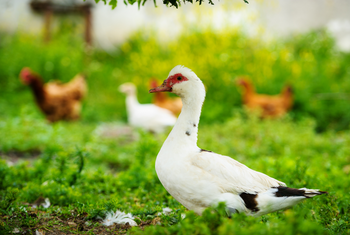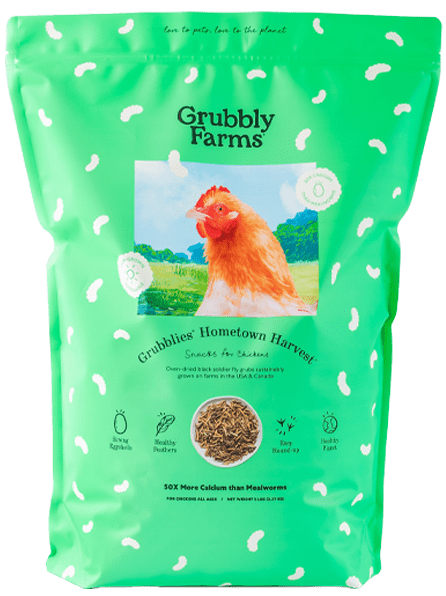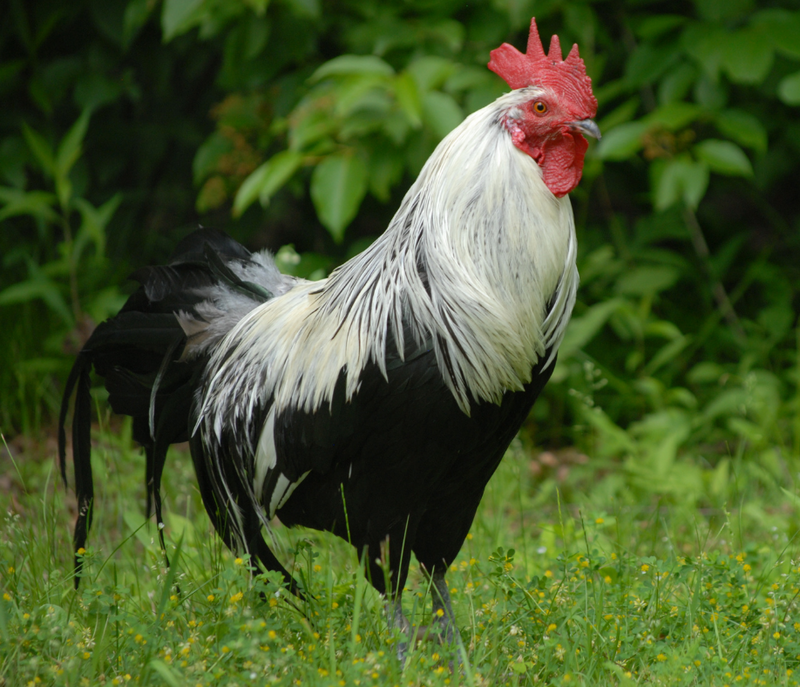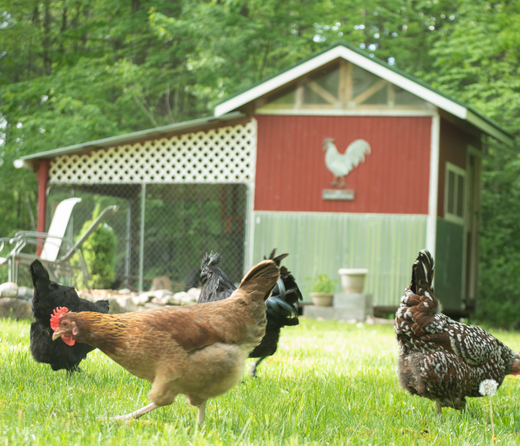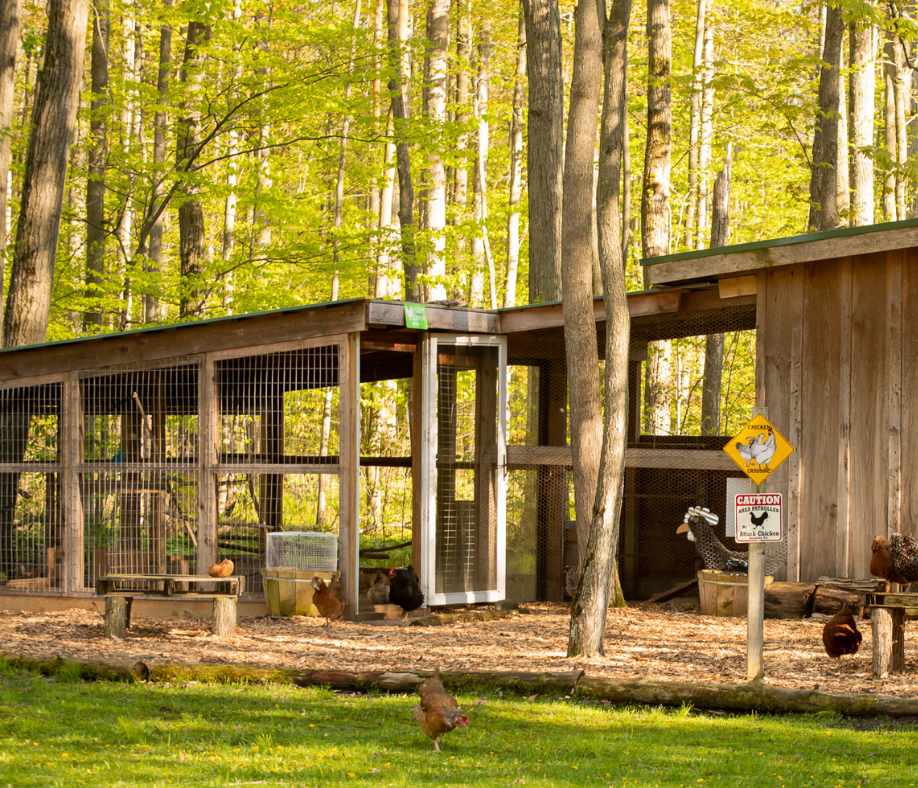Chickens or ducks? Or both? Knowing the difference between raising chickens and ducks is essential to help you decide which species is the best fit for you. Both types have their special features and differing care needs. Let’s see how raising backyard ducks compares to raising backyard chickens!

Ducks vs Chickens: Egg Production
Certain breeds of both chickens and ducks are excellent egg layers! Chicken breeds such as Leghorns or Isa Browns, and duck breeds like Khaki Campbells and Indian Runners can lay up to 300 eggs a year. Chickens will start laying when they are 4-5 months old. Ducks don’t usually start laying until closer to 6-7 months of age, however, they have a longer productive lifespan than chickens.
When it comes to year-round production, ducks have the upper hand. Some breeds of ducks don’t lay year-round, but the ones that do will lay on a regular basis and for more years than a chicken. They are less sensitive to environmental factors and will often lay even with minimal natural light. Keep in mind that duck eggs will be larger than chicken eggs. That means they will contain more fat, protein, cholesterol, and omega-3's. The extra-large eggs may also be harder to bake with in recipes. However, many people who have an allergy to chicken eggs can eat duck eggs just fine!
Grubbly Farms' Fresh Pecks and All Flock Layer Feeds are a nutritious feed to support egg production for ducks and hens.
Ducks vs Chickens: Housing
Both ducks and chickens can adapt to confinement or be free-range raised. Confinement means the birds are kept in an enclosed area with plenty of space to roam. Free-range means the birds are allowed access to as much property as is available.
Confinement
Chickens adapt better to confinement than ducks. Being able to adapt to confinement makes chickens ideal for small backyard situations. Some breeds adapt better to confinement than others, so choosing the best chicken breeds for your lifestyle is important. Despite the fact that chickens do better in confinement than ducks, they are also more prone to boredom and bullying behavior than ducks. Giving your flock access to pasture or limited free-range time can help reduce those behaviors. Ducks are harder to raise in confinement because they are messier than chickens and need access to a water source.
Free Range
Ducks prefer a free-range lifestyle and will happily forage for a majority of their own food. While they can be raised in a confined setting, they are much easier to care for and manage when they live a free-range lifestyle. You will still need to provide housing for the ducks to return to at night for safety. However, if they spend most of their day foraging, their housing will stay a lot cleaner. Free-range ducks will often forage for a majority of their own diet, making them self-sufficient and low maintenance.
One reason why ducks are easier to pasture raise is because they aren’t as destructive as chickens. Chickens will dig up roots and have a blast turning a green pasture into a barren waste. They need a more regular pasture rotation system than ducks. Ducks don’t do as much digging. They prefer grazing. However, they will often dig small holes with their bills in search of bugs. Ducks are also better at pest control than chickens.
Predator Vulnerability
Both ducks and chickens are attractive prey for many predators. Ducks are more susceptible to ground predators because they cannot fly. Chickens have a little better chance at defending themselves given that they can often fly out of reach and run faster than a duck can waddle. That means ducks will need a little more predator protection when it comes to free-ranging and housing them. If there is a large body of water available, ducks will often take to the water if possible when danger threatens.
Ducks vs Chickens: Maintenance & Management
Raising chickens and ducks do have some similarities, but there are also some differences you should be aware of when considering either species. Both species need a safe, predator-proof coop to sleep in at night and should be cleaned up after on a daily basis.
Coop
Chickens are usually housed in a chicken coop, whereas ducks are often kept in a duck house. Both chicken coops and duck houses should be predator proof, have good ventilation, and contain the necessities needed for raising either chickens or ducks. Chicken coops need to have roosting bars and nesting boxes. Chickens like to sleep on roosts that are off the ground and will lay their eggs in dark, safe locations like a nesting box. A duck house does not need either of those items. Ducks will make nests in the litter to sleep in at night. They will also use those ground nests to lay their eggs in instead of nesting boxes. The water source should also be kept outside of the duck house since ducks are extremely messy with their water!
Litter & Grit
While most litter options can be used for either chickens or ducks, you will want to consider that ducks are messier than chickens. Ducks naturally have wetter droppings than chickens, so having an absorbent litter in the duck house is mandatory.
Depending on how much time the ducks spend in their duck house, you may have to clean out the duck house more frequently than a chicken coop. In a chicken coop, you can install droppings boards or slings to make clean-up easier. However, since ducks sleep on the floor of their house, litter clean up may be a little more time consuming.
Grit is grit. Your chicken grit can be used for ducks just fine.
Coop Training
Chickens need to be cooped trained from a young age. Coop training entails teaching young chickens where to roost (sleep) at night. When you first move the young chickens out to their chicken coop, you will have to guide them inside the coop every evening until they learn to go in on their own.
Coop training can be made easy with the help of some tasty snacks, like Grubblies! If you free-range your flock, you will also have to coop train them to return to the coop after free-ranging. If you have ever tried to herd a flock of chickens, you know it’s nearly impossible! Training your flock to come when called (or at the shake of a bag) is well worth the time investment.
Ducks in general are easier to control than chickens. They are not quite as active as some chicken breeds and can be herded or controlled easier than a flock of chickens. In some regions of the world, ducks are routinely herded to different foraging locations. Being able to herd your ducks makes it a lot easier to get them back into their coop after free-ranging.
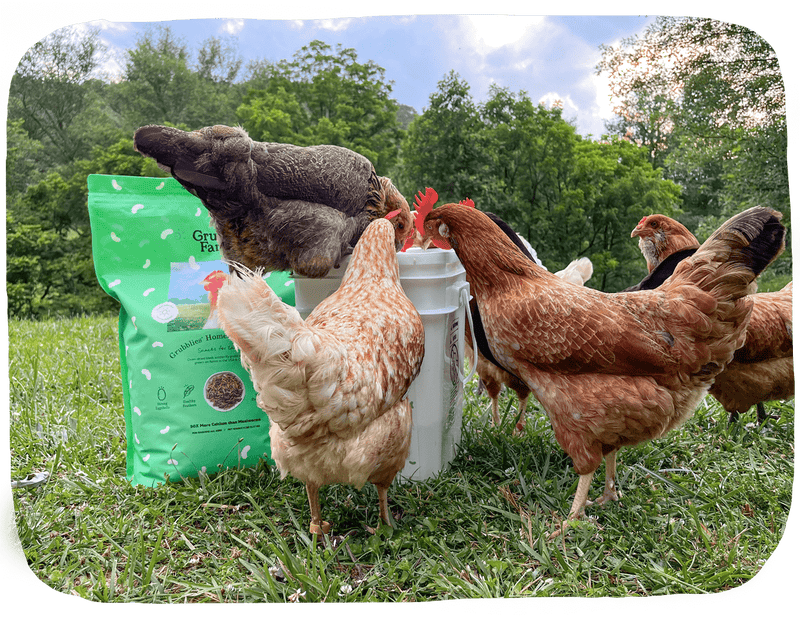
Grubblies
A healthy treat for your flock
With 50x more calcium than mealworms, treat your flock with Grubblies and help support strong eggshells.
Shop NowNoise
Chickens are known to be noisier than ducks. While each species does make some noise, the level of noise varies. Roosters are notoriously louder than drakes (male ducks) and hens can get pretty loud when they sing their ‘egg song’.
Fencing
Chickens are very active, and many breeds are good flyers. Fencing often has to be higher for chicken breeds than for ducks. Most domestic species of ducks aren’t the best flyers, so duck fencing doesn’t have to be as tall as for chickens. For either species, the fencing should be predator proof and keep them safe. Having a roof or cover over the fencing is helpful for containing chickens, but is good for both species to keep them protected from aerial predators.
Space
Both chickens and ducks need ample space in order for them stay active and healthy. In general, ducks need more space than chickens since some duck breeds are large and ducks like a more free-roam lifestyle. Since a duck house doesn’t need nesting boxes or roosts, it does make it easier to meet the housing space needs of ducks compared to chickens. When it comes to enclosure space, both chickens and ducks need plenty of space to move around, but ducks will also need access to a water source which may require more space. The amount of space you need to raise each species will depend on what breeds you choose and how many ducks or chickens you want to raise.
Ducks vs Chickens: Environmental Factors
When choosing what chicken or duck breeds to raise, you will have to take into consideration your local environmental factors. Seasonal temperatures and regional conditions are things to consider when choosing to raise ducks or chickens.
Seasonal Temperatures
Chicken breeds are often categorized as cold hardy or heat tolerant. If you live in an area that gets severe winter weather you will want to choose cold hardy breeds. If you live in an area that has hot summers, you should choose heat tolerant breeds. When choosing what duck breeds to raise, you aren’t quite as limited by environmental factors. Most duck breeds can adapt to cold or hot climates. Ducks will also be more consistent layers despite weather fluctuations.
Regional Conditions
Chickens should be raised in drier conditions than ducks. Keeping a healthy flock of chickens is much easier when they aren’t exposed to standing water which can contain harmful bacteria or wet conditions where disease causing organisms can thrive. Ducks can be raised in wetter conditions than chickens. Ducks love water and seem to have a stronger immune system when it comes to resisting disease-causing organisms found in wet places.
Ducks vs Chickens: Diet
Chickens and ducks can be fed a similar diet. However, each species does have slightly different nutritional needs. Most chicken breeds thrive on a more controlled diet. They need to be fed a ration that is completely formulated to meet their daily dietary needs. Chickens can be fed table scraps, treats, and healthy snacks in addition to their daily feed, but the quantities need to be controlled to keep your flock healthy.
If given the chance, chickens will also forage for some of their own food. Some chicken breeds are better foragers than others when it comes to free-ranging for their own food. Ducks on the other hand, prefer to forage for a majority of their own diet. They can be fed the same feed as chickens, but their dietary needs are slightly different in that they often need more protein and niacin in their diet.
Some complete feeds, such as Grubbly's Fresh Pecks, can be fed to both laying hens and ducks. With a healthy mix of insects, vegetables, whole grains, vitamins, minerals, and probiotics, you can keep both your chickens and your ducks happily nourished. The feed is formulated with 34 milligrams of niacin (vitamin B3) per pound. If your ducks need extra niacin, brewer's yeast is a great supplement to their diet.
Ducks vs Chickens: Water
One of the biggest differences when it comes to raising chickens or ducks is their water needs! Both chickens and ducks need to have access to clean drinking water. With chickens, that’s all they need. With ducks, they need a little more water to keep them healthy and happy. At a minimum, ducks need to be able to dunk their whole head into water on a daily basis in order to clear their nasal passages. They should also have access to water that they can bath in on a regular basis.
Ducks are much happier when they have access to a water source that they can bath and play in, not just drink from. Keeping water clean for ducks is a lot harder than for chickens since ducks actually get in their water. Having a permanent water source, like a pond, lake, or river is ideal for raising ducks. However, a man-made water source will also do as long as you don’t mind cleaning it on a daily basis!
Ducks vs Chickens: Health
In general, chickens are more susceptible to disease than ducks. Chickens thrive under controlled conditions that are kept dry and clean. Both young chicks and adult chickens need to have their immune systems built-up gradually so that they can resist the different diseases and pathogens found in their natural environment.
Ducks are known to be more disease resistant than chickens. They seem to naturally have a stronger immune system, which may be influenced by the fact that they love wet environments. Both ducklings and adult ducks are hardier and can have less health ailments than chickens.
Ducks vs Chickens: Availability
With backyard chicken keeping on the rise, finding a source for acquiring your first flock of chickens is not that hard! Raising ducks hasn’t seen quite as big of a surge, but you can still usually find ducklings sold right alongside chicks at farm stores. Baby chicks are often cheaper than ducklings and many times they can be sexed before they are sold. Ducklings are usually sold as a straight run (not sexed) and are more expensive than chicks.
Despite there being a wide variety of duck breeds, you don’t often have very many choices when it comes to buying ducklings locally or even from online hatcheries. If you are looking to acquire heritage or rare duck breeds, you may have to find a breeder. Finding a wide variety of chicken breeds to choose from is usually easier and you may have more choices to choose from. Keep in mind that you should buy chicks or ducklings from reputable sources if you want to raise a healthy, productive flock with good longevity.
Add to Your Feathered Family!
Raising chickens or ducks (or both) can be a fun and educational experience! Each species has its perks, but you will have to take into consideration the subtle differences in care. When choosing one over the other, consider which species best fits your backyard or homestead!





